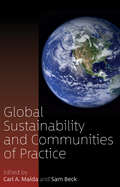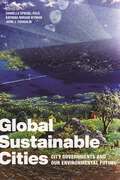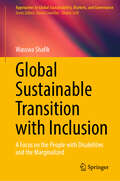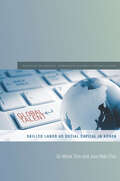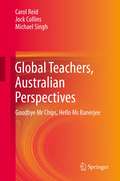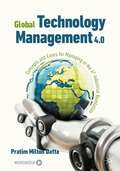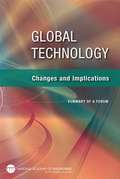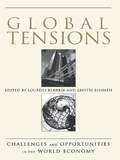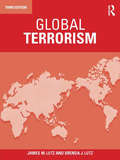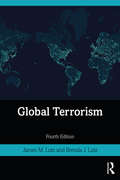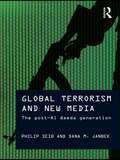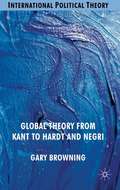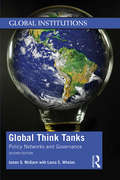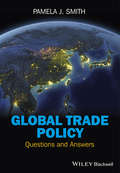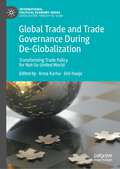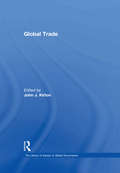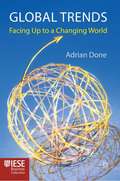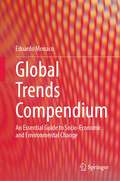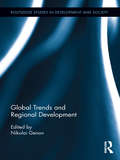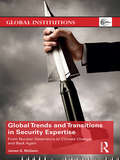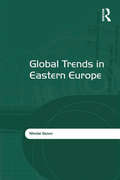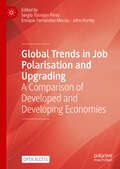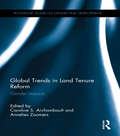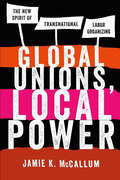- Table View
- List View
Global Sustainability and Communities of Practice
by Carl A. Maida Sam BeckCollaboration between experts and the public is vital for effective community engagement aimed at improving the lives of the most vulnerable in society, whether at the local or global level. Using case-based and theoretical chapters that examine rural and urban communities of practice, this volume illustrates how participatory researchers and students, as well as policy and community leaders, find ways to engage with the broader public when it comes to global sustainability research and practice.
Global Sustainable Cities: City Governments and Our Environmental Future
by Danielle Spiegel-Feld, Katrina Miriam Wyman, and John J. CoughlinPerspectives from worldwide experts on how major cities across the globe are responding to the major environmental threats of our time, including global climate change Over half of the world’s population now lives in cities, and this share is expected to increase in the coming decades. With growing urbanization, cities and their residents face substantial environmental challenges such as higher temperatures, droughts, wildfires, and increased flooding. In response to these pressing challenges, some cities have begun to develop local environmental regulations that supplement national and environmental laws. In so doing, cities have stepped into a role that has been historically dominated by higher levels of government.Global Sustainable Cities takes stock of the policies that have been implemented by cities around the world in recent years in several key areas: water, air pollution, greenhouse gas emissions, and climate adaptation. It examines the advantages—and potential drawbacks—of allowing cities to assume a significant role in environmental regulation, given the legal and political constraints in which cities operate.The contributors present a series of case studies of the actions that seven leading cities—Abu Dhabi, Beijing, Berlin, Delhi, London, New York, and Shanghai—are taking to improve their environments and adapt to climate change. The first volume of its kind, Global Sustainable Cities is a critical comparative assessment of the actions that major cities in the global North and South are taking to advance sustainability.
Global Sustainable Transition with Inclusion: A Focus on the People with Disabilities and the Marginalized (Approaches to Global Sustainability, Markets, and Governance)
by Wasswa ShafikThis book provides a comprehensive exploration of inclusive, sustainable development, emphasizing the critical need to integrate the perspectives and needs of people with disabilities and marginalized communities into the global sustainability transition to a sustainable future. Through highlighting the intersectionality of identity and the unique challenges faced by these groups, the book addresses a pressing issue: the often-overlooked barriers that hinder their full participation in sustainable transitions. Organized into three parts, the book first contextualizes the relationship between sustainability and inclusion. It delves into the historical and theoretical frameworks that shape our understanding of marginalization, exploring how disability intersects with various social identities. This foundation sets the stage for an in-depth analysis of the United Nations Sustainable Development Goals (SDGs) and the ways in which they can be made more inclusive, ensuring that no one is left behind. The second part identifies and examines the myriad barriers to inclusion within sustainable practices. It addresses structural, socioeconomic, and cultural obstacles that perpetuate exclusion while also critiquing existing policy frameworks for their limitations in addressing the needs of marginalized populations. Through case studies, the book highlights successful initiatives and innovative practices that promote accessibility and equity, mainly through the use of assistive technologies and community engagement. In the final section, the book outlines actionable strategies for fostering inclusive, sustainable development. It emphasizes the importance of community engagement, participatory decision-making, and the empowerment of marginalized voices. Additionally, it discusses metrics for monitoring and evaluating the impact of sustainability initiatives on people with disabilities, providing a framework for accountability and continuous improvement. This book aims to bridge the gap between sustainability and social justice, offering a roadmap for stakeholders, policymakers, and practitioners committed to creating a more inclusive world. This book targets academics, policymakers, non-profit societies, and activists working at the intersection of sustainability and social equity and serves as a vital resource for those seeking to understand and promote inclusive practices in the global sustainable transition.
Global Talent: Skilled Labor as Social Capital in Korea
by Gi-Wook Shin Joon Nak ChoiGlobal Talent seeks to examine the utility of skilled foreigners beyond their human capital value by focusing on their social capital potential, especially their role as transnational bridges between host and home countries. Gi-Wook Shin and Joon Nak Choi build on an emerging stream of research that conceptualizes global labor mobility as a positive-sum game in which countries and businesses benefit from building ties across geographic space, rather than the zero-sum game implied by the "global war for talent" and "brain drain" metaphors. The book empirically demonstrates its thesis by examination of the case of Korea: a state archetypical of those that have been embracing economic globalization while facing a demographic crisis-and one where the dominant narrative on the recruitment of skilled foreigners is largely negative. It reveals the unique benefits that foreign students and professionals can provide to Korea, by enhancing Korean firms' competitiveness in the global marketplace and by generating new jobs for Korean citizens rather than taking them away. As this research and its key findings are relevant to other advanced societies that seek to utilize skilled foreigners for economic development, the arguments made in this book offer insights that extend well beyond the Korean experience.
Global Teachers, Australian Perspectives: Goodbye Mr Chips, Hello Ms Banerjee
by Michael Singh Jock Collins Carol ReidThis is the first book on global teachers and the increasingly important phenomenon of 'brain circulation' in the global teaching profession. A teaching qualification is a passport to an international professional career: the global teacher is found in more and more classrooms around the world today. It is a two-way movement. This book looks at the growing importance of immigrant teachers in western countries today and at teachers who exit from western countries (emigrant teachers) seeking teaching experience in other countries. Drawing on the international literature in Europe, North America, Asia and elsewhere supplemented by rich insights derived from recent Australian research, the book outlines the personal, institutional and structural processes nationally and internationally underlying the increasing global circulation of teachers. It identifies the key drivers of global teacher mobility: a range of factors including family, lifestyle, classroom experience, travel, opportunities for advancement, discipline, linguistic skills, taxation rates, cultural factors and institutional frameworks and policy support. The book is the first detailed contemporary account of the experiences of Australian immigrant and emigrant teachers in the schools and communities where they teach and live. It makes an important and original theoretical and empirical contribution to the contemporary fields of sociology of education and immigration studies.
Global Technology Management 4.0: Concepts and Cases for Managing in the 4th Industrial Revolution
by Pratim Milton DattaTechnology is pervasive in today’s globalized world. Moreover, technology and globalization drive competitiveness and strategy, and must be managed well. This textbook uses technology management as the central theme to cover multiple business and social facets, including digital transformation, cybersecurity, international operations, marketing, finance, culture, human capital, and the political economy. The book is divided into four sections. Part 1 examines the confluence of globalization and technology from the first Industrial Revolution to the current Fourth Industrial Revolution. Part 2 introduces strategic and analytical metrics and models that are crucial to managerial decision-making. Part 3 discusses the basics of cybersecurity and combating cyber-threats to protect organization and its stakeholders. Part 4 focuses on sustainable operations, global projects, and digital transformation in a technology-centric, globalized world. The book will help students learn how to navigate business aspects of globalization and technology in the 4th Industrial Revolution (4IR). For instructors, the learning objectives and discussion questions help guide students in grasping the material.
Global Technology: Summary of a Forum
by Steve OlsonBeginning JavaScript with DOM Scripting and Ajax is an essential resource for modern JavaScript programming. This completely updated second edition covers everything you need to know to get up-to-speed with JavaScript development and add dynamic enhancements to web pages, right from the basics. As well as focusing on client-side JavaScript, you will also learn how to work with the Browser Object Model, the Document Object Model (DOM), how to use XML and JSON as well as communicate with service side scripts such as PHP. Find out how to: Construct good JavaScript syntax following modern coding practices Use JavaScript to communicate with the server and retrieve data Dynamically manipulate markup, validate forms and deal with images Debug applications using features inside the browser JavaScript is one of the most important technologies on the web. It provides the means to add dynamic functionality to your web pages and serves as the backbone of Ajax-style web development. Beginning JavaScript with DOM Scripting and Ajax will take you from being a JavaScript novice to work freely with this important technology - begin your JavaScript journey today! What you'll learn What functions, variables, events and objects are and how to use them. How build a site that will still work in the case that JavaScript is turned off. How to access and update part of the page using code. How to use JavaScript to communicate with the server and retrieve data. How to use JavaScript to for form validation and user feedback. How to use Third-Party Libraries like jQuery. Who this book is for Beginning JavaScript with DOM Scripting and Ajax is for the person who has a good grasp of HTML and CSS but wants to add JavaScript to their skillset. If you want to learn some basic programming concepts, have experience but need help updating your skills, or you're coming from another language, Beginning JavaScript with DOM Scripting and Ajax can help. Table of Contents Getting Started with JavaScript Data and Decisions From DHTML to DOM Scripting HTML5 and JavaScript Presentation and Behavior (CSS and Event Handling) Common Uses of JavaScript: Image and Windows JavaScript and User Integration: Navigation and Forms Back-End Interaction with Ajax and Node. js Data Validation Techniques Modern JavaScript Case Study: A Dynamic Gallery Using Third-Party JavaScript Appendix A: Debugging JavaScript
Global Tensions: Challenges and Opportunities in the World Economy
by Lourdes Benería Savitri BisnathAgainst the backdrop of demonstrations in Seattle, Porto Alegre and Genoa and within the context of growing resistances to free trade and the current global trends, Global Tensions takes a close look at the challenges posed by the processes of globalization at the beginning of the twenty-first century. Composed of original essays by renowned scholars, this volume explores controversial topics such as free trade, women's rights, labor standards, the World Trade Organization and global tensions.
Global Terrorism
by Brenda Lutz James LutzGlobal Terrorism 3rd edition continues to provide students with the most comprehensive introduction to terrorism as a global phenomenon. It introduces students to history, politics, ideologies and strategies of both contemporary and older terrorist groups. Written in a clear and accessible style, each chapter explains a different aspect of terrorism and illustrates this with a wide variety of detailed case studies from across the world. Although the focus is on the contemporary, the book also includes discussion of older terrorist groups. Building on the strengths of the previous editions, this edition has been revised and upadted throughout and includes new material on: Strategies of terrorism The future of Al-Qaeda after the death of Bin Laden Changes in the Middle East New case studies on Hizbollah, Afghanistan/Pakistan, Aum Shinrikyo (Japan), Militia movement in the US The unique combination of a genuinely historical focus and truly global coverage makes this an ideal introductory textbook for anyone studying terrorism.
Global Terrorism
by Brenda Lutz James LutzGlobal Terrorism, 4th edition continues to provide students with the most comprehensive introduction to terrorism as a global phenomenon. It introduces students to history, politics, ideologies, and strategies of both contemporary and earlier terrorist groups. Written in a clear and accessible style, each chapter explains a distinctive aspect of terrorism and discusses a wide variety of detailed case studies from around the world. Although the focus is on the contemporary, the book also includes discussion of preceding terrorist groups. Building on the strengths of the first three editions, this edition includes new material on: • Attacks by ISIS in Europe • Unrest in Afghanistan and Pakistan • Russia and Chechnya • Violence in Iraq • Decades of terrorism in Northern Ireland, Sri Lanka, Colombia, and the Basque region of Spain • Right wing terrorism in the United States The unique combination of a genuinely historical focus and truly global coverage makes this an ideal introductory textbook for anyone interested in the study of terrorism.
Global Terrorism and New Media: The Post-Al Qaeda Generation (Media, War and Security)
by Philip Seib Dana M. JanbekGlobal Terrorism and New Media carefully examines the content of terrorist websites and extremist television programming to provide a comprehensive look at how terrorist groups use new media today. Based partly on a content analysis of discussion boards and forums, the authors share their findings on how terrorism 1.0 is migrating to 2.0 where the interactive nature of new media is used to build virtual organization and community. Although the creative use of social networking tools such as Facebook may advance the reach of terrorist groups, the impact of their use of new media remains uncertain. The book pays particular attention to terrorist media efforts directed at women and children, which are evidence of the long-term strategy that some terrorist organizations have adopted, and the relationship between terrorists’ media presence and actual terrorist activity. This volume also looks at the future of terrorism online and analyzes lessons learned from counterterrorism strategies. This book will be of much interest to students of terrorism studies, media and communication studies, security studies and political science.
Global Terrorism: A Beginner's Guide (Beginner's Guides)
by Leonard WeinbergSince the terrible events of 9/11, more attention than ever has been paid to the threats and challenges posed by terrorists. Weinberg explains who the terrorists are, where they came from, what motivates them, and what, if anything, can be done to stop them. It provides a fascinating insight into how terrorist 'cells' operate and what they might do in the future. Leonard Weinberg is Foundation Professor of Political Science at the University of Nevada. He has also served as a consultant to the United Nations Office for the Prevention of Terrorism and was a recipient of the 1999 Thornton Peace Prize.
Global Theory from Kant to Hardt and Negri
by Gary BrowningGlobal theory represents an influential and popular means of understanding contemporary social and political phenomena. Human identity and social responsibilities are considered in a global context and in the light of a global human condition. A global perspective is assumed to be new and to supersede preceding social theory. However, if contemporary global theory is influential, its identity, assumptions and novelty are controversial. Global Theory from Kant to Hardt and Negri scrutinises global theory by examining how contemporary global theorists simultaneously draw upon and critique preceding modern theories. It re-thinks contemporary global ideas by relating them to the social thought of Kant, Hegel and Marx, and in so doing highlights divergent ambiguous aspects of contemporary global theories, as well as the continuing impact of the ideas of Kant, Hegel and Marx.
Global Think Tanks: Policy Networks and Governance (Global Institutions)
by James G. McGann Laura C. WhelanThis completely revised edition of Global Think Tanks: Policy Networks and Governance provides a clear description of and context for the global proliferation of think tanks. Presenting an important guide to the factors contributing this spread as well as the future of think tanks at the global, regional, and national level, the book reflects recent trends such as including globalization; digitalization; artificial intelligence; populism; and disinformation. It also includes a new chapter on shifting attitudes towards age and gender. Identifies the forces driving these phenomena by addressing some of the historical and current factors that have dominated policy debates around the world. explores the range of existing global think tanks and a representative group of global public policy networks and conducts detailed profiling of these organizations. extrapolates trends in current think tank research that provide a basis for understanding their impact on policy makers. identifies and critiques the role of global think tanks and global public policy networks in civil society and analyzes the challenges and opportunities facing them. recommends improvements to think tanks and global public policy networks so that they can continue to serve as a catalyst for civic engagement around the world. This book will be of great interest to all students of international relations and international organizations, alongside policy professionals working at think tanks around the world.
Global Trade Policy
by Pamela J. SmithUsing a unique, question-based format, Global Trade Policy offers accessible coverage of the key questions in trade and policy; it charts the changing policy landscape and evolving institutional arrangements for trade policies, examines trade theory, and provides students with an economic framework to better understand the current issues in national and international trade policy.Uses a unique, question-based format to explore the questions and current debates in international trade policy and their implicationsExplores trade theory to help guide discussions of trade policy, including traditional theories of inter-industry trade, as well as newer theories of intra-industry and intra-firm tradeExamines the national and international effects of widely used policies designed to directly and indirectly affect trade, and considers the evolving institutional arrangements for theseCharts the changing policy landscape from traditional trade policies - such as tariffs, quantitative restrictions, and export subsidies - to those including intellectual property rights, labor, the environment, and growth and development policiesCovers national as well as global perspectives and their interaction, helping to explain opposing views on trade policy and liberalizationIncludes applied exercises enabling students to explore open-ended and realistic questions of policy debate, making it ideal for classroom use; an instructor's manual and a range of other resources are available at www.wiley.com/go/globaltradepolicy
Global Trade and Trade Governance During De-Globalization: Transforming Trade Policy for Not-So-United World (International Political Economy Series)
by Anna Karhu Eini HaajaThis book takes a fresh and much needed perspective on the challenges of trade policy and explores possible futures for trade policy development. By taking the perspective of business studies, the book does not only focus on the economic, policy, or legislative perspectives, but views trade policy as a part of international business environment. The purpose of this book is to bring forward discussions on trade policy development and future development needs and offers a comprehensive read for international business researchers, practitioners and policymakers regarding the interconnections of trade policy and international business.
Global Trade: Voluntary Standards In Global Trade, Environment And Social Governance (The Library of Essays in Global Governance)
by John J. KirtonTrade has long been a core part of international relations. Bilateral, plurilateral and multilateral trade flows and agreements have arisen in many ways and in many areas over the centuries. From regional arrangements, such as the North American Free Trade Agreement, to the all-encompassing General Agreement on Tariffs and Trades and now the World Trade Organization, the system of global trade has seen struggles and successes alike. The traditional debate over liberalization and protectionism remains central today; and with ever-expanding globalization facing all states, the future of global trade seems to be no less controversial than it was centuries ago. By assembling the key scholarly works that have defined the field of global trade, this work addresses these debates and examines the past to see what the future of global trade might look like.
Global Trends
by Adrian DoneLooks at the bigger picture, and the future trends that are going to affect the global business world over the next few years. The author analyses traditional themes such as technology and sustainability but also takes into consideration the effects of developments in other areas such as health, education and demographics
Global Trends Compendium: An Essential Guide to Socio-Economic and Environmental Change
by Edoardo MonacoThis Compendium was conceived as a “pocket compass”, a practical guide that may help readers to orientate themselves while they explore global affairs and attempt to make sense of the highly interconnected, multidimensional challenges of contemporary human development. The book is intended to be an accessible, concise, yet comprehensive reference for anyone who hopes to better understand today’s world and its dramatic complexity. The aim is to highlight a relevant selection of the demographic, socio-economic, geo-political, and environmental macro-dynamics that define our time, and to explore in a practical way the indicators that can be used to monitor their evolution over time. In general, this project stems from the need to apply “systemic thinking” to the study of the world and to develop a holistic perspective that can bridge the gap that for too long has existed across academic disciplines and their respective focuses. The macro-trends featured in the book shed light, in particular, on the change that has been occurring over time in the vast Global South – a portion of the globe that accounts for over 80% of the world’s total population. The book’s ultimate – although not exclusive – target audience is undoubtedly composed of undergraduate students of subjects such as political science, international affairs, international development, human geography and the like. In addition, the Compendium may benefit professionals in both public and private organisations as well as members of the general public seeking to acquire "global development literacy" in manners that are academically sound, but also accessible and concise.
Global Trends and Regional Development (Routledge Studies in Development and Society)
by Nikolai GenovFor millennia, contact between societies was limited to trade or wars, a situation that changed profoundly with the development of global markets serving industrialization. The outcome was the emergence of one global human civilization, and one common future that will depend on the capacity of individuals and societies to manage the potentials for social development. This edited collection is dedicated to the discussion of four global trends: upgrading the rationality of organizations, individualization, the spreading of instrumental activism and universalization of value-normative systems. The mutual influence of these interrelated trends brings about both constructive and destructive effects in social life, social integration and change. Contributors examine questions such as: How do global trends pave their way in regions? What are the similarities and differences of regional development? How do agencies cope with the challenges of global trends in regional development?
Global Trends and Transitions in Security Expertise: From Nuclear Deterrence to Climate Change and Back Again (Global Institutions)
by James G. McGannThe scope of Security and International Affairs research has expanded tremendously since the end of the Cold War to include topics beyond the realm of war studies or military statecraft. The field—once devoted solely to the study of conventional military and nuclear security issues—has diversified to include foci often considered nontraditional, including peace and conflict, political, economic, environmental, and human security. In this exciting new volume, McGann has undertaken a quantitative and qualitative study of SIA think tanks, looking at global and regional trends in their research. He argues that the end of the Cold War marked a fundamental shift within the field of defense and security studies among think tanks and academics. Tracking the evolution of security as understood by researchers and policymakers is vital as the world follows the path of the Four Mores: more issues, more actors, more competition, and more conflict. As we move forward into a world of rapid change and ubiquitous uncertainty, think tanks will only become more prominent and influential. The volume concludes with an assessment of the future of Security and International Affairs studies and raises the possibility of a return to a traditional security focus driven by recent events in Europe and the Middle East. This will be an important resource for students and scholars of security studies, global governance, and think tanks.
Global Trends in Eastern Europe
by Nikolai GenovEastern Europe was once clearly defined by the centralized political and economic organization of the societies in the region. They shared the same official ideology and were members of the same alliances. After 1989, the region collapsed in an economic, political and cultural implosion. What were the moving forces of this profound change? What are its consequences? Could we try to reasonably foresee any future developments? In this thought-provoking book, Nikolai Genov presents a systematic description and explanation of Eastern European societal transformations after 1989. They are interpreted as adaptations to four global trends; upgrading the rationality of organizations; individualization; spreading of instrumental activism; and universalization of value-normative systems. Adaptations to these trends have generally been successful. However, Genov notes that the process is marked by many failures as well. They are mostly caused by path dependency in the societal development and by the varying quality of relevant decisions, other destructive developments are due to contradictions in the global trends themselves. Guided by the assumption that the societal and supranational integration mechanisms in Eastern Europe before 1989 could not resist the overwhelming power of global trends, Genov's controversial findings question visions about the end of history and simultaneously strengthen the confidence that most complex macro-social processes can be rationally managed. A timely book allowing for a much needed engagement in contemporary debates on the controversial processes in Eastern European transitions.
Global Trends in Job Polarisation and Upgrading: A Comparison of Developed and Developing Economies
by Enrique Fernández-Macías John Hurley Sergio Torrejón PérezThis open-access book offers a comparative analysis of changes in employment structures on a global scale, focusing on employment trends during the first decades of the 21st century across 17 developed and developing economies, including countries from Europe, North America, Central and Latin America, and Asia. The authors examine patterns of occupational change in all cases, with job upgrading and polarization being the most prevalent, and explore the factors driving these changes, such as technological change, the increased participation of women, the growth of service-oriented sectors, and others. Particular attention is given to the impact of the COVID-19 pandemic on employment. By applying consistent methods across all countries, the book provides a comprehensive understanding of employment dynamics and trends worldwide, representing one of the most significant efforts to produce comparative evidence on a global scale to date. As such, it will be of interest to researchers and policymakers focused on labor, inequality, and economic development.
Global Trends in Land Tenure Reform: Gender Impacts (Routledge ISS Gender, Sexuality and Development Studies)
by Caroline S. Archambault Annelies ZoomersThis book explores the gendered dimensions of recent land governance transformations across the globe in the wake of unprecedented pressures on land and natural resources. These complex contemporary forces are reconfiguring livelihoods and impacting women’s positions, their tenure security and well-being, and that of their families. Bringing together fourteen empirical community case studies from around the world, the book examines governance transformations of land and land-based resources resulting from four major processes of tenure change: commercial land based investments, the formalization of customary tenure, the privatization of communal lands, and post-conflict resettlement and redistribution reforms. Each contribution carefully analyses the gendered dimensions of these transformations, exploring both the gender impact of the land tenure reforms and the social and political economy within which these reforms materialize. The cases provide important insights for decision makers to better promote and design an effective gender lens into land tenure reforms and natural resource management policies. This book will be of great interest to researchers engaging with land and natural resource management issues from a wide variety of disciplines, including anthropology, sociology, development studies, and political science, as well as policy makers, practitioners, and activists concerned with environment, development, and social equity.
Global Unions, Local Power
by Jamie K. MccallumNews about labor unions is usually pessimistic, focusing on declining membership and failed campaigns. But there are encouraging signs that the labor movement is evolving its strategies to benefit workers in rapidly changing global economic conditions. Global Unions, Local Power tells the story of the most successful and aggressive campaign ever waged by workers across national borders. It begins in the United States in 2007 as SEIU struggled to organize private security guards at G4S, a global security services company that is the second largest employer in the world. Failing in its bid, SEIU changed course and sought allies in other countries in which G4S operated. Its efforts resulted in wage gains, benefits increases, new union formations, and an end to management reprisals in many countries throughout the Global South, though close attention is focused on developments in South Africa and India. In this book, Jamie K. McCallum looks beyond these achievements to probe the meaning of some of the less visible aspects of the campaign. Based on more than two years of fieldwork in nine countries and historical research into labor movement trends since the late 1960s, McCallum's findings reveal several paradoxes. Although global unionism is typically concerned with creating parity and universal standards across borders, local context can both undermine and empower the intentions of global actors, creating varied and uneven results. At the same time, despite being generally regarded as weaker than their European counterparts, U. S. unions are in the process of remaking the global labor movement in their own image. McCallum suggests that changes in political economy have encouraged unions to develop new ways to organize workers. He calls these "governance struggles," strategies that seek not to win worker rights but to make new rules of engagement with capital in order to establish a different terrain on which to organize.
